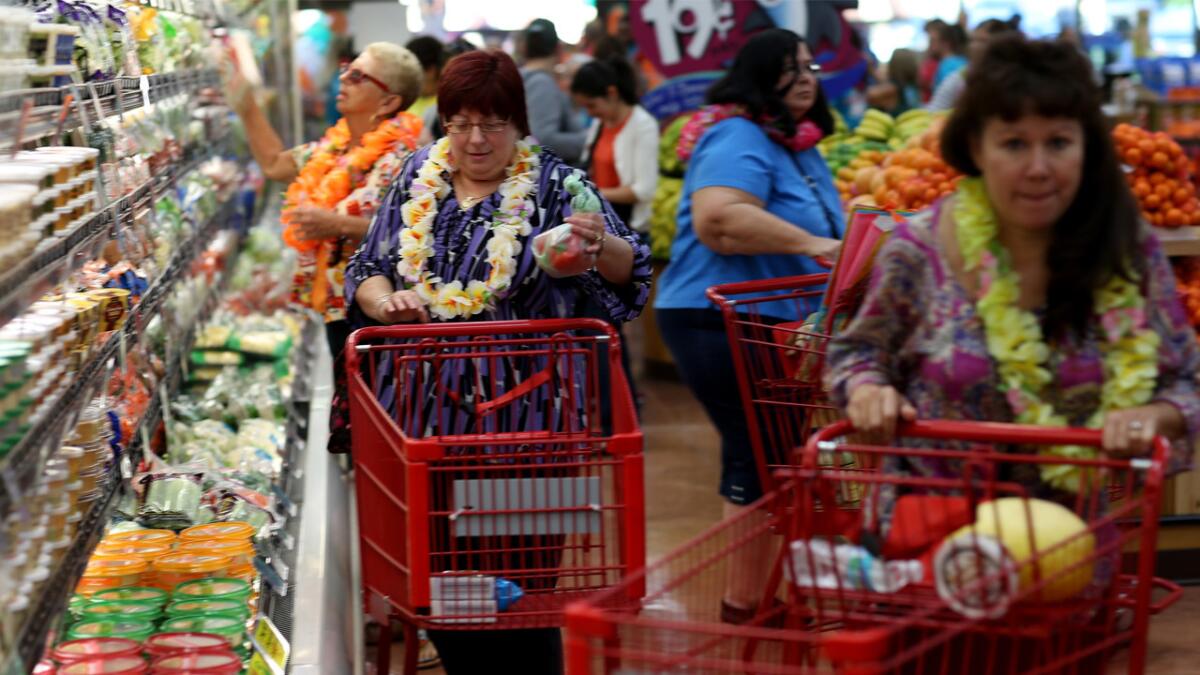Obesity, climate change and hunger must be fought as one, health experts declare

- Share via
Maybe, when it comes to finding a way out of a global crisis of obesity, we’re just thinking too small.
Maybe the steps needed to reverse a pandemic of unhealthy weight gain are the same as those needed to solve two other crises of human health: malnutrition and climate change.
So instead of trying to tackle each of these problems individually, public health experts recommend that we lash the three together.
In a treatise published Sunday in the British medical journal Lancet, a multinational commission argues that consumers, business leaders and policymakers must focus their efforts on steps that address at least two of these crises at a time. Only then can they can resolve this trio of emergencies fast and fully enough to make a difference, they wrote.
And no, the experts added: Tackling climate change, world hunger and obesity all at once is not an overreach.
But, the commission warned, it will require an ambitious restructuring of the economic incentives that drive the production and marketing of food. It will require new kinds of transportation systems. And it will demand that consumers demand and help pay for food that is subsidized, raised and distributed in new ways.
And, the commission said, it will require governments to stand up to the world’s food manufacturing giants and the industries that support them — a collection of actors known as “Big Food.”
Made up of 43 public health experts from 14 countries, the Lancet Commission on Obesity emphasized that the problems of obesity, malnutrition and climate change are inextricably linked by factors such as overconsumption, unchecked marketing and government failures.
If consumers, producers and regulators take those links into account with each choice they make, humans might stand a chance of averting global catastrophe, the experts wrote.
This way of thinking is so novel that the commission created a word for the three-headed hydra they are trying to address: “syndemic.”
The World Obesity Federation’s Tim Lobstein, a member of the commission, described the syndemic of obesity, malnutrition and climate change as “a synergy of co-occurring pandemics which interact with each other in place and time and have common societal and economic drivers.”
Those common drivers include industries that are not required to pay for the downstream costs their products impose on the health of consumers or the environment, Lobstein said.
The result, according to the commission’s reckoning:
• Roughly 2 billion people worldwide are overweight, and despite the costly health risks that come with this trend, no country has succeeded in reversing the fattening of its population.
• Chronic undernourishment afflicts 815 million people in the world, and more than 200 million of the world’s children are stunted or wasted by hunger.
• The food production system that allows these trends to continue is a major contributor to climate change, which threatens to exacerbate these nutritional disparities by fueling floods, droughts and wildfires.
“A transformative social movement … is needed to overcome the policy inertia,” the commissioners wrote. For that to happen, “a new narrative” is needed, they added.
They called for an international treaty — similar to those addressing tobacco use and climate change — to limit the political influence of agricultural and food production giants. And they recommend the redirection of $5 trillion in government subsidies away from harmful food products and toward sustainable alternatives.
Industries with commercial interests at stake will not yield without the kind of fight that has stymied change for decades, they wrote. Breaking their grip on policy will require funding from philanthropists to empower consumers’ demands for products, services and policies that feed the world healthier food produced with more respect for the planet.
Is such ambition fanciful?
“Changes around this issue have to begin at the local level,” said Dr. William Dietz, a professor of public health at George Washington University and one of the commission leaders. “To think this is going to happen right now at the national level is foolhardy.”
But some of the changes needed are already underway, Dietz said: Cities and states are raising taxes on sugary drinks and also aiming to meet goals set by the Paris climate treaty.
The World Resources Institute estimates that consumer demand for food that is healthier and sustainably produced is growing by at least 5% a year, Dietz said.
The Grocery Manufacturers Assn., which represents the nation’s leading manufacturers of foods and beverages, responded to the Lancet commission’s report with a call for cooperation.
The U.S. food, beverage and consumer product industry “shares a commitment to the well-being of consumers everywhere,” the GMA said in an emailed statement. “Only together can we solve some of the most pressing issues facing the world today.”
Marlene B. Schwartz, who directs the Rudd Center for Food Policy & Obesity at the University of Connecticut, applauded the commission’s willingness to look beyond the science of diet and call for broad-based action to change the way food is made and marketed.
“The food industry absolutely has to change,” Schwartz said. And if scientists from disparate fields are to inform the steps that need to be taken, she said, “we need to start talking to each other.”
The Lancet Commission on Obesity began with a more limited mandate: to update reports that were published in 2011 and 2015. But despite the issuance of 190 well-founded recommendations to improve diets and more than 50 to improve physical activity, Lobstein said, “barely any of these have been implemented in more than a handful of countries.”
Two weeks ago, a related panel called the Lancet EAT Commission outlined global targets for a diet that is both healthy and sustainable. Those commissioners called for most consumers to double their consumption of fruits, nuts, vegetables and legumes, with a massive redistribution of meat consumption. The ideal amount of beef or lamb would be about a half an ounce per day, per person, the commission found — a small fraction of U.S. consumption.
The livestock industry denounced those recommendations as radical, and it challenged the new report as well.
“U.S. farmers and ranchers lead the world in efficient practices that deliver unmatched nutrition and continue to reduce greenhouse gas emissions from agriculture to record lows,” said Kay Johnson Smith, president and CEO of the Animal Agriculture Alliance.
“The global challenge of feeding the world’s growing population and keeping our climate healthy will certainly not be met by excluding farmers’ experience and expertise,” she said.
Commission member Corinna Hawkes of the University of London insisted “we are not trying to put the food industry out of business. But we want it to exist in a different way,” she said. It should be a market in which smaller farmers and food producers can gain a foothold and thrive, she said.
Others weren’t so sure that regulating the food industry is the answer to such sprawling challenges.
“I’m reminded of the adage that for every complicated problem, there is a simple — and wrong — solution,” said Dan Glickman, a senior fellow at the Bipartisan Policy Center in Washington who led the Department of Agriculture during the Clinton administration. “To blame it all on Big Food — whoever that is — is not terribly helpful. How about taking on the medical world, and how few doctors know anything about nutrition? How about the role of schools and educators?“
Christopher Snowdon of the British libertarian think tank Institute of Economic Affairs denounced the members of the Lancet commission as “nanny-state zealots.” With their embrace of tobacco-style regulation of food and soft drinks, he added, they “make no secret of their desire to bypass democracy and use unaccountable global institutions to further their agenda.”
Cascade of catastrophe
Here are some examples of how the factors linking obesity, metabolism and climate change build upon one another, according to the Lancet commission:
Cars: The car-dominated transportation systems that support our couch-potato lifestyles not only exacerbate obesity. They generate somewhere between 14% and 25% of the heat-trapping greenhouse gases that are a key cause of climate change. Getting out of our cars and walking to more efficient public transit systems would help solve two problems at once.
Crops: The industrialized food-production system encourages farmers to grow crops like wheat and corn — both because it’s most efficient and because government subsidies encourage such specialization. Those are then used to make hyper-processed foods that do more for the bottom line than for our bodies. In addition to generating 25% to 30% of global greenhouse gas emissions, this mode of food production fuels obesity in rich countries like the United States. Meanwhile, in developing countries, there are children who are both obese from taking in too many empty calories and stunted from nutrient deficiencies.
Cattle: Red meat is consumed in unhealthy volumes by those in the industrialized West, and it requires the razing of forests and the mass production of animal feed, two drivers of global warming. Cattle production accounts for more than half of the agricultural sector’s contribution to greenhouse gas emissions, and the resulting climate change exacerbates the droughts and extreme weather events that wreck crops and deepen poverty and malnutrition in low-income countries.
MORE IN SCIENCE







